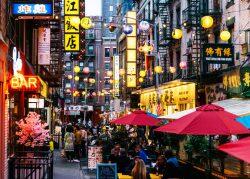Despite challenges stemming from the pandemic and a rise in crime, property owners and retail tenants in Oakland’s Chinatown are determined to preserve their neighborhood and the culture it supports.
Chinatown’s roots date back to the 1850s when Chinese immigrants first arrived in Oakland, making it one of the oldest Asian enclaves in the country. During the next 50 years, Japanese and Korean immigrants followed. The first stores that popped up on the six-block span between 6th and 12th street were “shrimp camps,” where merchants would sell shrimp they fished from San Francisco Bay.
Today Chinatown occupies the blocks roughly bounded by 6th and 12th streets and Broadway and Fallon Street. It features a diversity of retail options – from produce markets to furniture stores. Chinatown has transformed into a one-stop shop for consumers’ needs, but even with all the tradition associated with it, Chinatown has never become touristy.
“Oakland Chinatown is a unique neighborhood dating back to the late 1800s,” said Jay Roman, a broker at NAI Norcal who specializes in retail. “It has never been a tourist destination, but rather a place you’ll find locals working, shopping and dining.”
Retail vacancy
According to Roman, as the world struggled with the pandemic, Chinatown suffered too, resulting in the 10 percent permanent closure of businesses in the neighborhood over two and a half years. Already caught in a declining market during the second half of 2019, retail vacancy in Chinatown exceeded 6 percent in the first quarter of 2021, compared to less than 1 percent vacancy during 2019.
The pandemic brought another challenge to Chinatown as well – the rise of crime, which included elderly people being physically assaulted in the middle of the day. From March 2020 to February 2021, Oakland police investigated 140 crimes. The good news is crime seems to be down with 113 being investigated during the same time a year later. The city responded last year by increasing police presence in Chinatown.
Despite these challenges, business owners are determined to preserve Chinatown as a way of preserving their culture.
“I’m in Chinatown because the market is from China, and I never want that to change,” Violet Chen, a business owner who wished not to have her business disclosed, said.
Real estate professionals in Oakland share the feeling that the market will sustain Chinatown.
“My interaction with some of the retail owners is such that I can say they share the same sentiment: They aren’t going anywhere,” Rolando Reyes Jr., a commercial broker specializing in the Oakland area, said.
‘Tight-knit community’
According to Roman, there are not a lot of business owners willing to sell, and the ones that are, prioritize keeping any new business within the community.
“We understand that residents of the neighborhood have changed their buying behaviors with the recent upsurge of violent crimes, but the few retailers that are willing to sell are transacting directly with their tenants, who want to continue operating in Chinatown,” she said. “It’s a tight-knit community with generations of asset transfers.”
The continued drop in vacancy rates and the development of a new BART station near Lake Merritt indicates positive momentum for Chinatown to return to pre-pandemic normalcy. Roman also noted that Chinatown property owners declined to sell to developers at the height of the pandemic.
“The ranks of Oakland property buyers are chalk full of developers who have an eye to address the housing crisis, so seeing entire neighborhoods like Chinatown committed to the preservation of community should be taken as a sign of an improving local economy and a return to pre-pandemic retail,” she said.
Read more



